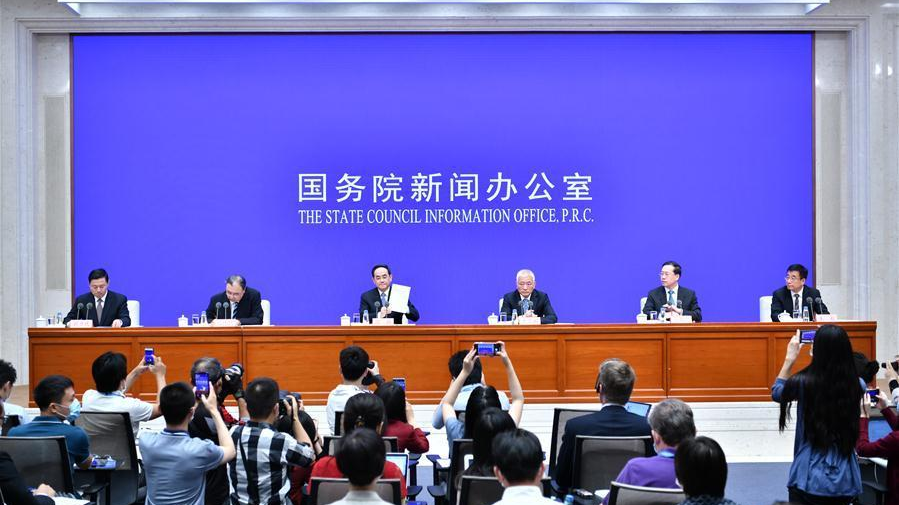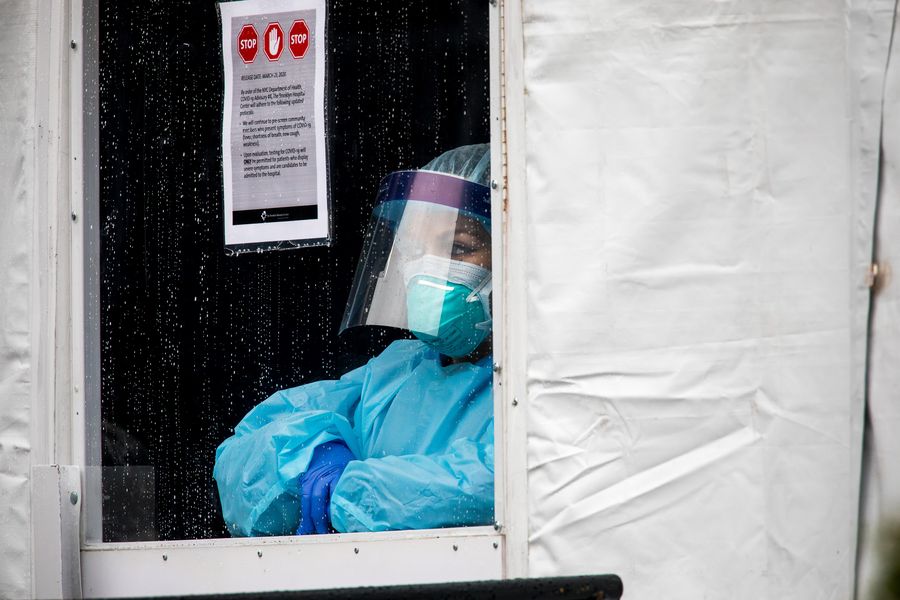
China's State Council Information Office holds a press conference on a white paper regarding the country's battle against COVID-19 in Beijing, capital of China, June 7, 2020. /Xinhua
China's State Council Information Office holds a press conference on a white paper regarding the country's battle against COVID-19 in Beijing, capital of China, June 7, 2020. /Xinhua
Editor's note: Chris Hawke is a graduate of the Columbia University Graduate School of Journalism and a journalist who has reported for over two decades from Beijing, New York, the United Nations, Tokyo, Bangkok, Islamabad and Kabul for AP, UPI and CBS. The article reflects the author's opinions and not necessarily the views of CGTN.
COVID-19 remains an urgent global health issue, and stopping its spread should be a top priority.
The epidemic continues to cut a deadly path around the world, with over 100,000 new cases a day. Nations that were initially spared are now bearing the brunt of COVID-19, with cases surging in South Asia, the Middle East, Africa and Latin America.
As the United States reopens for business and the number of cases in major American cities declines, attention is shifting to other matters. However, more than a third of states are witnessing a rise in new infections.
This epidemic is far from over.
China on June 7 released a 66-page white paper reviewing its response to the outbreak, highlighting the most effective elements to its response.
The white paper is also an implicit response to critics of China.
The white paper notes that within a month China, contained the spread of the disease; within two months, the daily increase in coronavirus cases was in single digits across the country; and within three months, the virus was practically eradicated in Wuhan.
This is a tremendous victory, as other nations struggling with their response are discovering.
The paper attributes the success to a number of factors, including centralized control over the response, strong measures to control its spread involving all levels of society, breaking the chain of transmission with travel bans, lockdowns, and business and school closings, varying the response on a regional basis, following the advice of experts, and providing free medical care.
As simple and obvious as this list seems, some nations did not do these things, and mostly suffered the consequences with high numbers of unnecessary deaths.

A healthcare worker looks out of the window of a tent in front of Brooklyn Hospital Center in the Brooklyn borough of New York, the United States, April 24, 2020. /Xinhua
A healthcare worker looks out of the window of a tent in front of Brooklyn Hospital Center in the Brooklyn borough of New York, the United States, April 24, 2020. /Xinhua
The U.S., for example, did not have a centralized coordinated response. It did not take strong measures, leaving these to state governors. There were no travel bans or efforts to prevent travel to and from hard-hit areas within the country. Businesses, schools and other institutions are reopening even though the virus is still spreading. Medical care is not free. The advice of medical experts has been ignored from the earliest days, when President Donald Trump ignored memos and reports and delayed briefings. Experts are displaced by Vice President Mike Pence to control messaging. Dr Anthony Fauci, one of the few figures on the coronavirus task force to publicly push back against Trump's consistent downplaying of the threat, said earlier this month he had not met or spoken with Trump in two weeks.
An interesting section of the white paper deals with China's communications with the U.S. regarding the coronavirus threat.
Trump has complained repeatedly that China did not warn the U.S. There has already been a substantial amount of reporting showing that Trump was warned by his intelligence staff and his own officials about the threat early and often, but frustrated them by showing no interest.
The white paper adds some interesting details. It says that on January 4, the head of China's Center for Disease Control had a telephone conversation with his U.S. counterpart, briefing him about the emerging new pneumonia cases. The two spoke again on January 8.
Similarly, China first alerted the World Health Organization (WHO) on January 3. The WHO in turn released its first briefing about the coronavirus on January 5.
The WHO has come under unprecedented attack for its supportive remarks about China's response to the outbreak. For example, on February 29, the organization released a report saying, "In the face of a previously unknown virus, China has rolled out perhaps the most ambitious, agile and aggressive disease containment effort in history… As striking, has been the uncompromising rigor of strategy application that proved to be a hallmark in every setting and context where it was examined."
The Trump administration paints comments like this as biased or made under political duress. But China indeed has had incredible success where so many others have failed. The praise is justified.
The contrast seems especially stark in comparison to places like the United States, which had the advantage of a warning from China and the WHO, and the benefit and scientific knowledge based on China's experiences.
Despite this, five months after the first warning the U.S. does not have the epidemic under control, and in fact has no plan to do so. It appears as if the U.S. federal government gave up from the start and never made any serious epidemic control efforts. Instead, Trump has directed his energy at blaming China.
China is continuing to aid other nations, particular economically weaker countries, with their coronavirus response. It is providing much of the world with the medical supplies required to fight the threat, and has been generous sharing the scientific knowledge it has learned, publishing dozens of papers in leading journals such as The Lancet, Science, Nature and The New England Journal of Medicine. China, unlike the U.S., has offered to share its vaccine research with the rest of the world.
The coronavirus epidemic should not be treated as some sort of trivial partisan game, but a matter of life and death. There is plenty of time in the future to focus on lessons learned and how a future response could be improved. The global response now should focus on cooperation and saving lives.
(If you want to contribute and have specific expertise, please contact us at opinions@cgtn.com.)